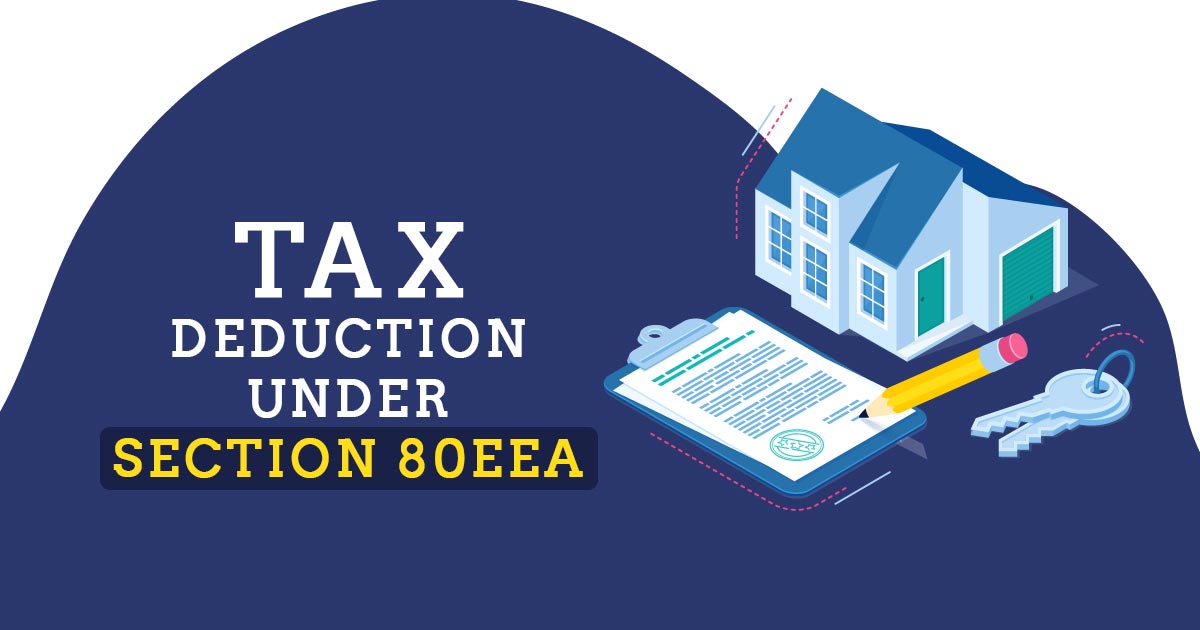
Deduction for the interest on loan taken for specific house property- Here the discussion is for the Outlines of Section 80EEA, Eligibility conditions to be qualified for deduction under 80EEA, Calculation of Deduction under Section 80EEA with Instances and Taxability of the deduction under Section 80EEA.
Introduction to Section 80EEA
Section 80EEA of the Income Tax Act 1961 as revised for the assessment year 2023-24 is concerned with the 80EEA furnishing the incentive for the first time to the buyers of the home through providing the benefits of the income tax.
In accordance with this section, an individual who obtained a loan from a financial institution for the reason of buying or building a residential property may deduct Rs. 1,50,000 from their taxable income in addition to the deductions authorized by sections 80C, 80CCC, and 80CCD on the interest paid on the loan.
Conditions Needed to Qualify for an 80EEA Deduction
To qualify for a deduction under Section 80EEA, a person must meet the following conditions:
- The individual taxpayer has to be an Indian citizen.
- The loan should have been obtained from one of the banking institutions that the Central Government has listed, as well as from other financial institutions such as finance businesses and home financing companies.
- The loan should have been obtained in joint or sole names for the acquisition or building of the residential property.
- The loan had to have been sanctioned between April 1, 2019, and March 31, 2022.
- The loan must not have crossed the limit of Rs. 45,00,000.
- A residential property that the taxpayer currently owns should not have been purchased with a loan.
- The taxpayer shouldn’t have purchased a different residential property on or before the loan’s approval date.
- The taxpayer should not have made an identical claim for a deduction under any other provision.
Example-Based Calculation of the Deduction U/S 80EEA
The deductions allowed by Section 24 are in addition to those allowed by Section 80EEA. The deduction would be restricted to the amount of Rs 1,50,000 or the interest subjected to be paid in the assessment year whichever would be lower.
Important: Tax Benefit on Home Loan Interest and Principle
The amount of interest due should be less than the loan amount. Additionally, it should be noted that any additional deductions for loan repayment, such as the principle payback under section 80C, 80CCD, etc., should be disregarded when computing the deduction.
For instance, when the taxpayer has claimed the loan of Rs. 20,00,000 and has paid Rs. 1,20,000 as interest through the FY 2020-21, and claimed for the deduction under section 80C of Rs. 50,000 for the principal repayment, under section 80EEA of Rs. 70,000 (1,50,000-80,000), he is qualified for a deduction.
Section 80EEA Taxability of the Deduction
For the relevant A.Y. 2024–2025, deductions under 80EEA may be taken into account when calculating the assessee’s total income. The deduction must be permitted from the gross total income, which also includes income from self-employment, rental property, capital gains, etc. The loss from other sources cannot be offset by the taxpayer.
Read Also: Income Tax Benefits on the Housing Loan in India
Example: In order to acquire a residential property in the F.Y. 2020–21, Mr X, an Indian resident, borrowed Rs. 25,00,000 from a bank that the Central Government had approved, paying Rs. 1,50,000 in interest. He qualifies for a 1,50,000 rupee deduction under Section 80EEA.
During the FY 2021–2022, he additionally made long-term capital gains of Rs. 5,00,000 and Rs. 1,00,000 by renting out his second home. He is eligible for a deduction of Rs. 1,50,000 under Section 80EEA, and the remaining sum is taxable.
Closure: The person who buys the home for the first time would get incentives under section 80EEA via providing income tax advantages. Conditions for eligibility and deductions allowed under the section are covered above. In order to claim this deduction without running into any problems, sufficient documentation and a property declaration may be required.